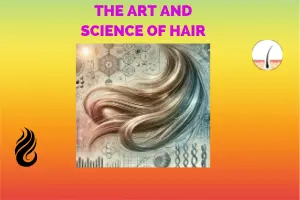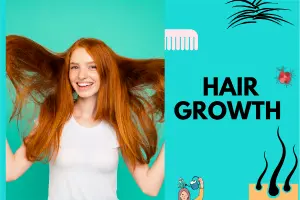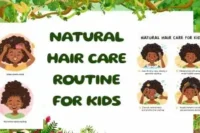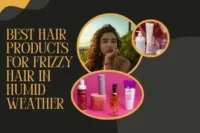Discovering Your Mane’s Personality – The 12 Types of Hair
Published: 14 Oct 2024
Hair isn’t just hair- it’s part of who we are. Often called our crowning glory, your strands say a lot about your personality and style.
But with so many different types, it’s natural to wonder: What do these types mean? And how do I take care of mine the right way?
In this guide, we’re diving into the 12 types of hair. You’ll learn what sets each type apart, how to care for it, and styling tips to bring out the best in your natural texture. Whether your hair is silky straight or tightly coiled, this guide is your map to better hair days.
Type 1: Straight Hair
Type 1: Straight Hair is naturally smooth with no curl pattern, making it sleek and shiny by nature.
What It Looks Like
Straight hair is smooth, sleek, and has no natural curl. It lies flat and reflects light well, which gives it a naturally shiny appearance. Oils travel easily from the scalp down the hair shaft, keeping it hydrated but sometimes greasy—so mastering straight hair care is key to maintaining balance and lasting shine.
How to Care for Straight Hair
- Use a lightweight, sulfate-free shampoo.
- Avoid heavy conditioners near the roots.
- Wash regularly to manage oil buildup.
- Clarify once a week if your hair gets oily fast.
Style Ideas
Straight hair is incredibly versatile. Try:
- Sleek ponytails or buns
- Sharp bob cuts
- Layered looks with volume at the crown. Use volumizing mousse or dry shampoo to add lift without weighing it down.
Type 2: Wavy Hair
Type 2: Wavy Hair forms gentle bends or loose S-shaped waves, offering natural volume and texture. With the right Wavy hair care tips, you can enhance definition, reduce frizz, and keep your waves looking effortlessly beautiful.
Wavy hair has a gentle “S” shape.

- It’s prone to frizz but can be styled easily with the right products for definition and hold.
What It Looks Like
It’s the middle ground between straight and curly and comes in different textures- Type 2A (loose waves), 2B (medium waves), and 2C (thicker, more defined waves).
How to Care for Wavy Hair
- Use moisturizing shampoos and conditioners.
- Avoid heavy products that can weigh down waves.
- Apply a light mousse or curl cream for definition.
- Air-dry or diffuse for the best shape.
Style Ideas
Wavy hair shines with low-maintenance styles like:
Braided crowns. Finger-combing instead of brushing helps maintain your wave pattern.
Beach waves
Half-up messy buns
Type 3- Curly Hair
Curly hair has springy curls that form spirals or ringlets. It’s full of personality but can get dry and frizzy if not properly cared for. Types include 3A (loose curls), 3B (tight spirals), and 3C (dense curls).

How to Care for Curly Hair
- Use sulfate-free, moisture-rich products.
- Deep condition weekly to hydrate curls.
- Apply leave-in conditioners and curl enhancers while hair is wet.
- Avoid over-washing to keep natural oils intact.
Style Ideas
Show off your curls with:
Twist-outs or braid-outs. Always use a diffuser when blow-drying to enhance bounce and reduce frizz.
Wash-and-go styles
Afro puffs
Type 4: Coily Hair
Type 4: Coily Hair features tight curls or zigzag patterns and is the most delicate of all hair types.
What It Looks Like
Coily hair, or kinky hair, forms tight Z-patterns or tiny coils. It’s fragile, shrinks when dry, and has the most volume. Type 4A has soft coils, 4B has sharp angles, and 4C is densely packed and often has no defined pattern.
How to Care for Coily Hair
- Moisture is everything! Use creamy leave-ins and oils.
- Try LOC or LCO methods (Leave-in, Oil, Cream).
- Limit heat and chemical treatments.
- Use satin bonnets at night to retain moisture.
Style Ideas
Celebrate your coils with:
- Bantu knots
- Twist-outs
- Protective styles like braids and updos
Type 5: Fine Hair
Curly hair has springy curls that form spirals or ringlets. It’s full of personality but can get dry and frizzy if not properly cared for. Types include 3A (loose curls), 3B (tight spirals), and 3C (dense curls). While different from The Art of Managing Fine Hair, curly hair also requires tailored care and the right moisture balance to thrive.

Fine hair has thin strands and often feels soft and silky. It gets weighed down easily and can look flat, but it can still hold volume with the right care.
How to Care for Fine Hair
- Choose volumizing shampoos and lightweight conditioners.
- Avoid heavy oils and butters.
- Limit product buildup with regular clarifying.
Style Ideas
Add body and movement with:
Layers
Dry shampoo at the roots
Blow-dry techniques that lift hair at the crown
Type 6: Medium Hair
Type 6: Medium Hair has strands that are thicker than fine hair but not as coarse as thick hair, offering a balanced texture.
What It Looks Like
Medium hair is neither too thick nor too fine. It has a good body and holds styles well, making it a balanced, manageable texture.
How to Care for Medium Hair
- Use regular shampoo and conditioner based on your hair’s moisture level.
- Deep condition biweekly.
- Trim regularly to avoid split ends.
Style Ideas
Try: Braided styles or buns for versatility
Soft curls: Sleek blowouts
Type 7: Thick Hair
Type 7: Thick Hair features dense strands that provide volume and strength but can be harder to style. Understanding the Secret to Thicker Hair includes learning how to manage this fullness with the right techniques and products.

Thick hair has a larger strand diameter and a fuller appearance. It offers volume but can feel heavy and require more effort to style and maintain.
How to Care for Thick Hair
- Use moisture-rich shampoo and conditioner.
- Apply a leave-in conditioner or serum to manage frizz.
- Detangle in sections to avoid breakage.
Style Ideas
Thick hair can rock:
- Long layers to reduce bulk
- Statement updos
- Braids and twists with volume
Type 8: Dry Hair
Type 8: Dry Hair lacks moisture, often feeling rough, brittle, or frizzy to the touch. Following the right dry hair care tips can help restore hydration, improve texture, and bring back natural shine.
What It Looks Like
Dry hair lacks moisture and can feel rough or look dull. It may be caused by genetics, weather, or over-styling.
How to Care for Dry Hair
- Avoid sulfates and alcohol-based products.
- Deep condition regularly.
- Apply nourishing oils like argan or jojoba.
- Reduce heat styling.
Style Ideas
Keep it healthy with:
Silk scarves to protect the ends
Low-heat curls
Loose buns or protective styles
Type 9: Oily Hair
Sebum buildup causes greasy roots and flat strands.

Scalp Care
- Wash with mild shampoos
- Avoid over-conditioning
- Try apple cider vinegar rinses
Oil-Free Styles
High buns, braids, and dry shampoo to refresh and volumize.
Type 10: Normal Hair
Type 10: Normal Hair is well-balanced, not too oily or dry, and typically easy to manage. With a consistent normal hair care routine, it stays healthy, shiny, and low-maintenance.
What It Looks Like
Normal hair is well-balanced, not too oily or dry. It has a natural shine and is relatively easy to maintain.
How to Care for Normal Hair
- Stick to a simple wash routine with gentle shampoo and conditioner.
- Deep condition occasionally.
- Get trims every 6–8 weeks.
Style Ideas
Explore:
- Loose waves
- Sleek straight looks
- Textured ponytails or buns
Type 11: Color-Treated Hair
Color-treated hair has been dyed or bleached and often feels drier or more porous. Following proper Color-Treated Hair care tips can help maintain vibrancy, prevent damage, and keep your hair soft and healthy.

Without proper care, it may fade, break, or feel brittle.
How to Care for Color-Treated Hair
- Use shampoos made for color protection.
- Deep condition weekly.
- Avoid excessive heat and sun exposure.
Style Ideas
To keep color vibrant:
- Try air-dried styles
- Use a heat protectant before styling
- Rock your natural texture with minimal fuss
Type 12: Chemically-Treated Hair (Relaxed, Permed, or Straightened)
Type 12: Chemically-treated hair (Relaxed, Permed, or straightened) has an altered structure and needs extra care to prevent damage and dryness.
What It Looks Like
Chemically-treated hair has been altered for straightness, curl, or texture. These treatments weaken the hair shaft, and extra care is needed to prevent breakage.
How to Care for Chemically-Treated Hair
- Choose protein-rich products for strength.
- Moisturize regularly to prevent brittleness.
- Avoid overlapping treatments.
Style Ideas
Keep it chic with:
- Silk wraps
- Protective styles
- Flexi-rod sets for bounce without heat
Final Thoughts
Each hair type is special in its way. From sleek and straight to tight coils, the 12 types of hair show just how unique every strand can be. Understanding your hair’s true personality helps you treat it better. It’s not just about looks, it’s about care.
Whether it’s figuring out what products work best, how often to trim, or which hairstyles suit your vibe, knowing your type is step one to loving your mane. Once you know where your hair fits among the 12 types of hair, you can care for it with more confidence and ease. And when your hair feels loved, it shows.
To find your hair type, wash it with a gentle shampoo and let it air dry without adding any products. Observe whether it dries straight, wavy, curly, or coily, which tells you your curl pattern. Also consider factors like thickness, density, and porosity. Combining all of these traits will help you fully understand your unique hair type.
Yes, hair type can change throughout life. Hormonal changes like puberty, pregnancy, or menopause can alter texture or curl pattern. Aging can also make hair thinner, straighter, or coarser. Even lifestyle and health changes—like stress, illness, or medication—can shift the way your hair behaves.
Curly hair tends to be drier because natural oils travel more slowly down spiral strands. For this reason, sulfate-free, moisturizing shampoos are best since they cleanse gently without stripping moisture. Look for formulas enriched with ingredients like shea butter, aloe vera, or coconut oil. Using the right shampoo helps curls stay soft, bouncy, and defined.
If your scalp produces excess oil, washing it 2–3 times a week is usually enough. Washing daily can strip too much oil and make the scalp overcompensate, producing even more oil. A mild or balancing shampoo is best for controlling grease without drying your ends. In between washes, dry shampoo can refresh your roots.
Fine hair can easily become flat if heavy products are used. Stick to lightweight mousses, sprays, or volumizing foams instead of thick creams or oils. Blow-drying upside down or using dry shampoo at the roots can add instant lift. Avoid product buildup, which makes fine hair look limp.
Dry hair happens when it loses its natural moisture and protective oils. Over-styling with heat tools, frequent coloring, and harsh shampoos are common causes. Environmental factors like sun exposure, chlorine, or dry air also worsen dryness. Without enough moisture, hair becomes dull, frizzy, and prone to breakage.
Yes, you can mix products as long as they suit your hair’s specific needs. For example, someone with fine but dry hair might use lightweight volumizing mousse along with a hydrating conditioner. The key is not the “hair type” label on the product, but whether it addresses issues like moisture, strength, or frizz. Mixing wisely can give you customized results.
No, brushing curly hair daily can lead to frizz and breakage. Instead, detangle gently with your fingers or a wide-tooth comb while your hair is wet and conditioned. This helps preserve the curl pattern and reduces damage. Daily brushing is better suited for straight hair types, not curls.
Thick hair often needs a cut that reduces bulk while keeping shape. Layered cuts are the best choice because they remove heaviness while enhancing movement. Long layers create flow, while shorter textured layers give bounce and volume. The right cut prevents hair from looking too heavy or unmanageable.
For many people, yes, natural hair care is gentler and preserves the hair’s original health. Chemical treatments like relaxers, perms, or bleaching can weaken the strands and cause long-term damage if overused. Natural care focuses on hydration, protective styling, and avoiding harsh ingredients. This helps maintain strength, texture, and shine over time.

- Be Respectful
- Stay Relevant
- Stay Positive
- True Feedback
- Encourage Discussion
- Avoid Spamming
- No Fake News
- Don't Copy-Paste
- No Personal Attacks

- Be Respectful
- Stay Relevant
- Stay Positive
- True Feedback
- Encourage Discussion
- Avoid Spamming
- No Fake News
- Don't Copy-Paste
- No Personal Attacks





